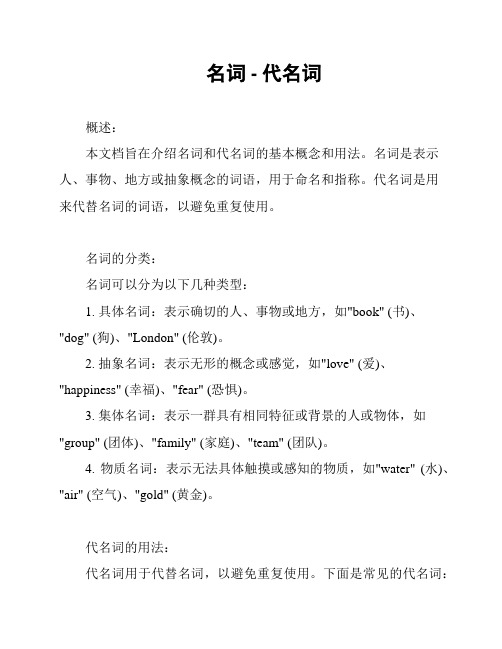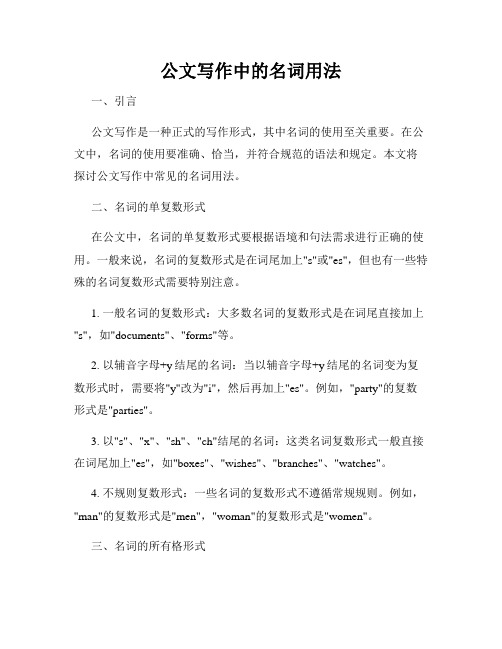抽象名词的使用
名词 - 代名词

名词 - 代名词概述:本文档旨在介绍名词和代名词的基本概念和用法。
名词是表示人、事物、地方或抽象概念的词语,用于命名和指称。
代名词是用来代替名词的词语,以避免重复使用。
名词的分类:名词可以分为以下几种类型:1. 具体名词:表示确切的人、事物或地方,如"book" (书)、"dog" (狗)、"London" (伦敦)。
2. 抽象名词:表示无形的概念或感觉,如"love" (爱)、"happiness" (幸福)、"fear" (恐惧)。
3. 集体名词:表示一群具有相同特征或背景的人或物体,如"group" (团体)、"family" (家庭)、"team" (团队)。
4. 物质名词:表示无法具体触摸或感知的物质,如"water" (水)、"air" (空气)、"gold" (黄金)。
代名词的用法:代名词用于代替名词,以避免重复使用。
下面是常见的代名词:1. 主格代名词:用于代替名词作为句子的主语,如"I" (我)、"you" (你)、"he" (他)。
2. 宾格代名词:用于代替名词作为句子的宾语,如"me" (我)、"you" (你)、"him" (他)。
3. 形容词性物主代词:用于表示名词所属关系,如"my" (我的)、"your" (你的)、"his" (他的)。
4. 名词性物主代词:用于代替名词作为句子的主语或宾语,如"mine" (我的)、"yours" (你的)、"his" (他的)。
名词的分类及用法可数名词与不可数名词

名词的分类及用法可数名词与不可数名词名词的分类及用法:可数名词与不可数名词名词作为语法中的一类词汇,用来指称人、事物、概念等。
根据其可数性,名词可分为可数名词和不可数名词。
一、可数名词可数名词用来指称可以进行数目计算的人、事物、概念等。
它们可以用单数或复数形式出现,并且可以与数量词、数词等进行搭配。
1. 单数形式可数名词的单数形式用来指称一个人或一件事物。
例如:a book(一本书)、an apple(一个苹果)等。
2. 复数形式可数名词的复数形式用来指称两个或两个以上的人、事物。
一般情况下,复数形式是在单数形式后面加上“-s”或“-es”。
例如:books (书)、apples(苹果)等。
但也有一些名词的复数形式变化规则不同。
例如:man(单数)→men(复数)。
3. 数量词的使用可数名词可以和数量词进行搭配,来表达具体的数量。
例如:two books(两本书)、many apples(许多苹果)等。
二、不可数名词不可数名词用来指称无法具体进行数目计算的物质、抽象概念等。
它们只有单数形式,不能加上“-s”或“-es”,并且不能与数量词直接搭配。
1. 物质名词物质名词用来指称一种不可具体计数的物质或液体。
例如:water (水)、milk(牛奶)等。
2. 抽象名词抽象名词用来指称抽象概念、情感、状态等不可具体计数的事物。
例如:happiness(幸福)、knowledge(知识)等。
3. 非可数名词的表达方式为了表达具体的数量,可以使用一些量词或单位词来修饰不可数名词。
例如:a glass of water(一杯水)、a piece of advice(一条建议)。
总结:名词根据其可数性可以分为可数名词和不可数名词。
可数名词可以用单数和复数形式,可以与数量词搭配;而不可数名词只有单数形式,不能与数量词直接搭配,需要使用量词或单位词来表达具体的数量。
公文写作中的名词用法

公文写作中的名词用法一、引言公文写作是一种正式的写作形式,其中名词的使用至关重要。
在公文中,名词的使用要准确、恰当,并符合规范的语法和规定。
本文将探讨公文写作中常见的名词用法。
二、名词的单复数形式在公文中,名词的单复数形式要根据语境和句法需求进行正确的使用。
一般来说,名词的复数形式是在词尾加上"s"或"es",但也有一些特殊的名词复数形式需要特别注意。
1. 一般名词的复数形式:大多数名词的复数形式是在词尾直接加上"s",如"documents"、"forms"等。
2. 以辅音字母+y结尾的名词:当以辅音字母+y结尾的名词变为复数形式时,需要将"y"改为"i",然后再加上"es"。
例如,"party"的复数形式是"parties"。
3. 以"s"、"x"、"sh"、"ch"结尾的名词:这类名词复数形式一般直接在词尾加上"es",如"boxes"、"wishes"、"branches"、"watches"。
4. 不规则复数形式:一些名词的复数形式不遵循常规规则。
例如,"man"的复数形式是"men","woman"的复数形式是"women"。
三、名词的所有格形式在公文写作中,我们常常需要使用名词的所有格形式来表示所属关系。
一般来说,名词的所有格形式是在词尾加上"'s"。
1. 单数名词的所有格形式:大多数单数名词的所有格形式是在词尾加上"'s",如"company's"、"government's"。
石油化工英语翻译中奈达功能对等理论的合理运用

世的翻译理论学派代表人物,而且他精通多国语言,从事多种学科的研究工作,在翻译理论方面具有很深的造诣,取得了丰硕的研究成果。
上世纪六十年代,奈达的著作《翻译科学探索》与广大读者见面了,在该书中,他首次提出了“形式对等”和“动态对等”的概念,而他更加看重动态对等。
奈达博士认为,不同的语言,不管是形式上,还是内容上,都存在较大的不同,因此,在实践中,“形式对等的翻译”是非常罕见的,而“动态对等”则注重与原语信息最大程度相近的对等翻译。
动态对等翻译,就是译文读者对译文所做的反应与原文读者所做出的反应是基本相同的,换句话说,就是最接近的自然对等。
从奈达功能对等理论的演变发展来看,该理论的核心是,保持译文用词的自然通顺,传达的内容比较准确。
奈达的功能对等理论把译文读者的地位极大的提升了,比较重视译文读者的语言文化习惯、理解欣赏能力、对译文的反应等。
虽然功能对等理论包括形式对等和内容对等,但是奈达认为,当形式对等和内容对等两者之间发生矛盾,而不能兼得的时候,只能保留内容对等,而不得不舍弃形式对等。
3 石油化工英语的常用翻译方法分析3.1 省略法所谓的省略法,就是英文句子中,有些词语的含义不必全盘翻译出来,在整个翻译的文章中,虽然不见该词的翻译,但是总体来看,已经有其词的含义蕴含译文之中了,已经不需要在累赘,再翻译出其词义。
简单来说,就是省略一些不必要的词语,或者翻译出来后,容易造成句子累赘的,亦或者,如果翻译出来,将不符合该种语言的使用规范和使用习惯等,省略的词语部分是不影响整个句子大意的。
例如,In this research framework grains are those that are easily differentiated from a finergrained matrix under a 40X objective microscope.这个句子正确译文是:在这个研究中,骨架颗粒是在40倍显微物镜下易于与细粒基质区分开的晶粒。
解析名词表达效果

解析名词表达效果名词表达是写作中常用的一种表达方式,可以使文章更加简洁明了。
本文将解析名词表达的效果,并提供一些使用名词表达的实用技巧。
1. 简洁清晰:名词表达可以用较少的词汇来传达更多的信息,使句子更加简洁清晰。
通过使用名词,可以直接指代特定的人、事、物或概念,避免重复使用形容词或动词,提高文章的可读性。
:名词表达可以用较少的词汇来传达更多的信息,使句子更加简洁清晰。
通过使用名词,可以直接指代特定的人、事、物或概念,避免重复使用形容词或动词,提高文章的可读性。
2. 抽象概括:名词表达可以将复杂的概念或理论进行抽象化概括,使文章更具逻辑性和条理性。
通过使用适当的抽象名词,可以简明扼要地表达复杂的思想和观点。
:名词表达可以将复杂的概念或理论进行抽象化概括,使文章更具逻辑性和条理性。
通过使用适当的抽象名词,可以简明扼要地表达复杂的思想和观点。
3. 强调重点:名词表达可以突出文章中的重点信息,使其更加凸显和引人注目。
通过使用具有强调意义的名词,可以使读者更加关注文章的核心内容,提高阅读效果。
:名词表达可以突出文章中的重点信息,使其更加凸显和引人注目。
通过使用具有强调意义的名词,可以使读者更加关注文章的核心内容,提高阅读效果。
4. 彰显专业性:在学术或专业领域的写作中,使用适当的名词表达可以彰显作者的专业性和深度。
通过使用相关的专业名词,可以表达作者对该领域的了解和理解,增加文章的信任度和权威性。
:在学术或专业领域的写作中,使用适当的名词表达可以彰显作者的专业性和深度。
通过使用相关的专业名词,可以表达作者对该领域的了解和理解,增加文章的信任度和权威性。
以下是一些使用名词表达的实用技巧:- 明确名词选择:在使用名词表达时,要特别注意选择准确的名词来传达所需的意思。
应该避免使用模糊的、不确切的名词,以免给读者造成困惑或误解。
明确名词选择:在使用名词表达时,要特别注意选择准确的名词来传达所需的意思。
应该避免使用模糊的、不确切的名词,以免给读者造成困惑或误解。
现代汉语抽象名词和量词的搭配研究

现代汉语抽象名词和量词的搭配研究近些年来,随着抽象概念在汉语中的应用不断增加,量词也越来越多地被应用起来,将抽象名词变得更加具体。
在当代汉语语境中,抽象名词的伴随量词搭配也变得比以往更加复杂丰富。
本文以“现代汉语抽象名词和量词的搭配研究”为研究主题,探讨抽象名词和量词之间的关系,以期进一步提高我们把握抽象名词的准确性。
一、量词与抽象名词的联系量词作为汉语句子结构中一个主要组成部分,可以用来表示一个客观存在的抽象概念的数量。
在语言结构中,量词与抽象名词之间的关系是极为密切的,其目的就是为了反映客观存在的多余的东西或者抽象概念的数量。
比如,副词“非常”与量词“很”结合,说出“非常很”,这句话实际上表达的就是“很多”,而常用在形容词和动词后面的“很”,就是强调客观存在该抽象概念的多少。
二、量词在抽象名词的使用上的特点当抽象名词与量词搭配的时候,有一些特殊的使用,本文将以抽象名词“失败”和“错误”为例来展开讨论。
(1)首先,在一般情况下,当“失败”和“错误”被用作句子主语时,常常使用“有”,来表示存在一定数量的失败和错误,比如:“有很多失败和错误”,这里有一定数量的失败和错误,而“失败”和“错误”被认为是一种抽象的概念,所以在这里使用量词“很多”来表示失败和错误的数量。
(2)其次,当“失败”和“错误”用作句子宾语时,也常常使用量词,这样可以表示接受者接受的失败和错误的数量,比如:“遭受许多失败和错误”,这里用“许多”来表示接受者遭受的失败和错误的数量。
三、量词在抽象名词的准确性上的重要性量词在抽象名词的准确性上的重要性主要体现在三个方面:(1)首先,使用量词时,要保证抽象名词准确表达出抽象概念的数量。
比如:“有很多失败和错误”,“很多”就是一个量词,它表达出存在多少个失败和错误,从而可以更加准确地表达抽象概念的数量。
(2)其次,由于量词的使用会使抽象名词变得具体、明确,所以表达出的内容也比较准确。
比如:“遭受许多失败和错误”,“许多”这个量词可以更准确地表示出接受者所遭受的失败和错误的数量。
名词词汇大全-概述说明以及解释
名词词汇大全-概述说明以及解释1.引言1.1 概述概述名词是语言中最基本、最常用的词汇之一,它用来表示人、事、物或概念。
在语法上,名词通常作为句子的主语、宾语或其他成分的修饰语。
名词词汇的掌握对于学习语言和表达思想非常重要。
本文旨在为读者提供一个名词词汇的大全,帮助他们系统地学习和运用这些词汇。
名词词汇可以按照不同的分类方式进行归类。
一种常见的分类方式是根据名词的意义和用法进行分类。
例如,人名、地名、国名、动物名、植物名等都是根据名词所指代的对象进行分类的。
另一种分类方式是根据名词的语法特点进行分类,例如,可数名词和不可数名词、单数名词和复数名词等。
在本文中,我们将按照这两种分类方式依次介绍各类名词词汇。
在接下来的正文部分,我们将详细介绍各个名词分类的要点和例子。
通过学习这些名词词汇,读者将能够更加准确地表达自己的想法,丰富自己的词汇量,并提高对语言的理解能力。
本文的目的是帮助读者系统地学习和掌握名词词汇。
通过阅读本文,读者将能够了解名词的基本概念和分类方式,掌握各类名词的要点和用法,并能够在日常生活和学习中正确地运用这些词汇。
接下来,我们将开始介绍各个名词分类的要点和例子。
希望读者能够认真阅读,并能够从中受益。
1.2 文章结构文章的结构是指整篇文章的组织方式和布局,合理的结构能够使文章内容更清晰、逻辑更严谨。
本文的结构主要包括引言、正文和结论三个部分。
引言部分旨在引入文章的主题和背景,概述文章的内容,并阐述撰写此篇文章的目的。
通过引言,读者可以对文章有一个整体的了解,进而更好地理解后续的内容。
正文是文章的核心部分,主要呈现名词词汇的详细分类和要点。
本文中,正文分为两个部分:名词词汇分类1和名词词汇分类2。
每个分类下又包含了相应的要点,用以详细描述该分类下的名词词汇。
名词词汇分类1包括了若干个具有相关性的名词词汇,通过对每个词汇的介绍和解释,读者可以更好地理解和掌握这些词汇的意义和用法。
在每个分类下,进一步细分了要点1和要点2,以便更系统地呈现相关内容。
英汉抽象名词浅谈
英汉抽象名词浅谈2019-09-28摘要:抽象名词是任何语⾔中都存在的⼀种客观现象,⼤量使⽤抽象名词是英语的特⾊之⼀,⽽汉语中却很少使⽤,这就形成了英汉表达的⼀个重⼤不同之处。
本⽂主要以两篇实例来说明抽象名词在英汉语中使⽤的差异,并分析造成这种差异的原因,给出翻译启⽰。
关键词:抽象名词英汉差异⼀、抽象名词概说抽象名词是⼀类特殊的名词,是相对于具体名词来说的⼀种叫法,主要表⽰⾏为、品质等“从典型性上来讲是观察不到和不可测量的”抽象概念。
英语和汉语中都存在抽象名词。
1.英语抽象名词英语中⼤量使⽤抽象名词,由此英语也被称作“名词优势于动词”语⾔。
英语的抽象名词主要有三类。
(1)⾏为抽象名词:⼀般由动词加动词后缀构成,如:realization, development, existence, pressure, arrival等。
(2)品质抽象名词:⼀般由形容词加形容词后缀构成,如:ability, health, safety, efficiency, significance等。
(3)固有抽象名词:这类抽象名词由英语语⾔直接形成,表达实际⽣活中抽象的概念,如:opinion,thought,reason,notion, art等。
英语抽象名词表达的主要表现形式是N + of + N,如:the richness of the soil, the growth of crops, the abundance of evidence等。
其它表现形式还有of + N, N + of, N + prep.(with, to, about, at), with + N, sb.’s+N等。
2.汉语抽象名词⼈们对汉语中抽象名词的认识由来已久。
马建忠早在⼀百多年前就指出“通名”是“表事物之⾊相者,盖离乎体质以为⾔也”。
这相当于现在的抽象名词的⼀部分。
抽象名词在语法上最为明显且重要的特征,就是与量词的结合能⼒远不如个体名词强,仅限于“种、类、点⼉、些”和虚化的“个”及其它修辞性借⽤量词。
常见病句类型代词使用错误修改方法是根据上下文和语法规则选择合适的代词
常见病句类型代词使用错误修改方法是根据上下文和语法规则选择合适的代词病句是写作中常见的问题,其中代词的使用错误是一个常见的病句类型。
代词在句子中起到替代名词的作用,能够使句子简洁明了。
然而,不正确的代词使用可能导致句子的含义含糊不清,甚至与原意相悖。
因此,本文将介绍常见的代词使用错误类型,并给出针对不同类型的修改方法。
1. 人称代词的误用人称代词是用来指称和代替人的称呼的词语。
常见的人称代词包括:I, you, he, she, it, we, and they。
然而,在使用人称代词时,需要根据具体的语境和语法规则选择适当的人称代词。
例如,当我们在谈论自己的观点或经历时,应该使用第一人称代词“I”,而不能使用第二或第三人称代词。
同样地,当我们在和他人进行对话时,应该使用适当的第二人称代词“you”,而不是错误地使用其他代词。
修改方法:在使用人称代词时,要准确地把握句子的语境和意图,选择正确的人称代词。
尤其是在写作中,要注意自己的观点和立场,避免使用不合适的人称代词。
2. 指代不清的代词指代代词用于代替前文中已经提及的名词或名词短语,以避免重复。
然而,有时候我们在使用指代代词时,指代的对象并不清晰明确,容易导致语义混淆。
修改方法:在使用指代代词之前,应该确保前文中已经提及了一个明确的名词或名词短语。
另外,要注意代词和被代词在性、数、格等方面的一致性,以确保代词的指代清晰。
3. 具体/抽象名词代词的错误使用具体名词和抽象名词代词指代的对象不同。
具体名词代词用于代替具体的事物或人,而抽象名词代词则用于代替抽象的概念、感情等。
因此,在使用具体/抽象名词代词时,需要根据具体的语境和意义选择合适的代词。
修改方法:在使用具体/抽象名词代词时,要根据句子的意思和上下文来判断所指代的对象是具体的还是抽象的,选择合适的代词。
4. 主宾一致性代词的错误使用主宾一致性代词用于在句子中代替主语或宾语,以避免重复。
错误的使用主宾一致性代词可能导致句子的结构不完整或语义不清晰。
英语语法中名词的使用
名词可以分为专有名词(Proper Nouns)和普通名词 (Common Nouns),专有名词是某个(些)⼈,地⽅,机构等专有的名称,如Beijing,China等。
普通名词是⼀类⼈或东西或是⼀个抽象概念的名词,如:book,sadness等。
普通名词⼜可分为下⾯四类: 1)个体名词(Individual Nouns):表⽰某类⼈或东西中的个体,如:gun。
2)集体名词(Collective Nouns):表⽰若⼲个个体组成的集合体,如:family。
3)物质名词(Material Nouns):表⽰⽆法分为个体的实物,如:air。
4)抽象名词(Abstract Nouns):表⽰动作、状态、品质、感情等抽象概念,如:work。
个体名词和集体名词可以⽤数⽬来计算,称为可数名词(Countable Nouns),物质名词和抽象名词⼀般⽆法⽤数⽬计算,称为不可数名词(Uncountable Nouns)。
归纳⼀下,名词的分类可以下图表⽰: _______________________________________ | |专有名词 | | | 名 | | 个体名词 | | | | | | 可数名词 | | | | 集体名词 | | | |普通名词 | | | | 词 | | 物质名词 | | | | | | 不可数名词| | | | 抽象名词 | |1.1 名词复数的规则变化___________________________________________________ 情况 构成⽅法 读⾳ 例词__________________________________________________⼀般情况 加 -s 1.清辅⾳后读/s/; map-maps 2.浊辅⾳和元⾳后 bag-bags 读 /z/; car-cars___________________________________________________ 以s,sh,ch,x等结尾的词 加 -es 读 /iz/ bus-buses watch-watches___________________________________________________以ce,se,ze,(d)ge等结尾的词 加 -s 读 /iz/ license-licenses___________________________________________________以辅⾳字母+y 变y 为i结尾的词 再加es 读 /z/ baby---babies___________________________________________________其它名词复数的规则变化1) 以y结尾的专有名词,或元⾳字母+y 结尾的名词变复数时,直接加s变复数: 如: two Marys the Henrys monkey---monkeys holiday---holidays ⽐较:层楼:storey ---storeys story---stories2) 以o 结尾的名词,变复数时: a. 加s,如: photo---photos piano---pianos radio---radios zoo---zoos; b. 加es,如:potato--potatoes tomato--tomatoes c. 均可,如:zero---zeros / zeroes 3) 以f或fe 结尾的名词变复数时: a. 加s,如: belief---beliefs roof---roofs safe---safes gulf---gulfs; b. 去f,fe 加ves,如:half---halves knife---knives leaf---leaves wolf---wolves wife---wives life---lives thief---thieves; c. 均可,如: handkerchief: handkerchiefs / handkerchieves名词复数的不规则变化1)child---children foot---feet tooth---teeth mouse---mice man---men woman---women 注意:与 man 和 woman构成的合成词,其复数形式也是 -men 和-women。
- 1、下载文档前请自行甄别文档内容的完整性,平台不提供额外的编辑、内容补充、找答案等附加服务。
- 2、"仅部分预览"的文档,不可在线预览部分如存在完整性等问题,可反馈申请退款(可完整预览的文档不适用该条件!)。
- 3、如文档侵犯您的权益,请联系客服反馈,我们会尽快为您处理(人工客服工作时间:9:00-18:30)。
抽象名词的使用:
1.College life filled me with excitement.
大学生活让我充满了兴奋。
2.Carefui comparison of two ways of life will show the superiority of the former over the latter.
Carefui比较两个的生活方式将显示的优越性超过后者
3.Our parents always expect progress of us in school and question its absence.。
我们的父母总是期望的进展我们在学校,没有问题。
介词短语的使用
1.People with skill in social relations admit their
mistakes,and take their share of blame.
人与社会关系的技能承认自己的错误,并采取共同的指责
2I traveled to Beijing on a story assignment.
我去过北京在分配故事。
2.In order to attend the conference ,he returned to
Beijing for more information and verification.
为了参加会议,他回到北京更多信息和验证
形容词的使用
1Low productivity and inappropriate policies contribute mainly to poverty in rural areas.
低效率和不恰当的政策贡献主要是农村贫困
2.Some suggest lower government spending and higher salaries for teacher.
有人建议降低政府开支,提高教师工资
3.The policy of China’s opening to the world can be
only continued by its closer ties with the world. 中国的对外开放政策,世界才能继续执行其加强与世界的联系。
分词结构和独立主格的使用
1.Amid mounting social discontent over inflation ,the
government had to slow its reforms.
在社会的不满情绪不断加剧的通货膨胀,政府被迫放慢改革。
2Following the abrupt decline of female workers in 1995 ,it began to rise in 2000
突然下降后的女性员工在1995年,它在2000年开始上升
2. Washing machines have grown to 96%in 2000,with
private cars lagging far behind with only 20% in 2000洗衣机已经增长到2000年的96%,远远落后与私人汽车在2000年只有20%
常见的程度副词
Absolutely adv. 绝对地;完全地
adequately adv. 充分地;足够
altogether
n. 整个;裸体
adv. 完全地;总共;总而言之
almost adv. 差不多,几乎
amazingly adv. 令人惊讶地;惊奇地
awfully adv. 可怕地;十分;非常;很
badly adv. 非常,很;严重地,厉害地;恶劣地
completely adv. 完全地,彻底地;完整地
considerably adv. 相当地;非常地
网络释义┈┈┈┈┈┈┈┈┈┈┈┈┈┈┈┈┈┈┈┈┈┈┈┈┈┈┈┈┈┈┈┈┈drastically adv. 彻底地;激烈地
enormously adv. 巨大地,庞大地;非常地,在极大程度上
entirely adv. 完全地,彻底地
excessively adv. 过分地;极度
extensively adv. 广阔地;广大地
extremely adv. 非常,极其;极端地
fairly adv. 相当地;公平地;简直
fully adv. 充分地;完全地;彻底
greatly adv. 很,大大地;非常
highly adv. 高度地;非常;非常赞许地immensely adv. 极大地;无限地;广大地;庞大intensely adv. 强烈地;紧张地;热情地
largely adv. 主要地;大部分;大量地
moderately adv. 适度地;中庸地;有节制地nearly adv. 差不多,几乎;密切地
partly adv. 部分地;在一定程度上perfectly adv. 完美地;完全地;无瑕疵地poorly adj. 身体不舒服的;心情恶劣的
adv. 贫穷地;贫乏地;不充分地
positively adv. 肯定地;明确地;断然地practically adv. 实际地;几乎;事实上
profoundly adv. 深刻地;深深地;极度地
quite adv. 很;相当;完全
rather adv. 宁可,宁愿;相当
int. 当然啦(回答问题时用)
really adv. 实际上,事实上;真正地,真实地;真的吗?(表语气)
reasonably
remarkably
significantly
simply
slightly
somewhat
soundly
strongly
sufficiently
supremely
totally
tremendously
utterly
virtually。
